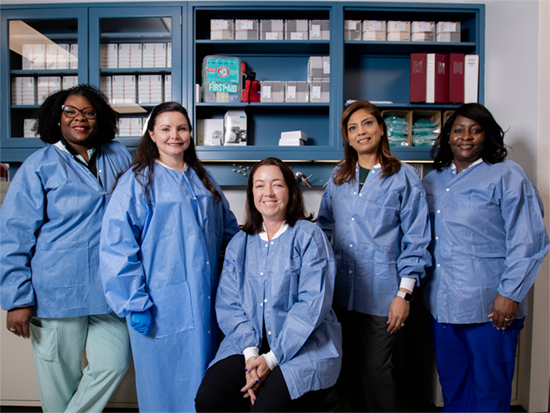Imagine a research lab that is pushing the boundaries of science while also taking bold steps to sustainability.
Since 2019, the UAB OB/GYN Research and Diagnostic Laboratory, led by Akila Subramaniam, M.D., MPH, associate professor in the Department of Obstetrics and Gynecology and Maternal-Fetal Medicine division director, has actively participated in UAB’s Green Labs Program, reducing environmental impact while maintaining research excellence. The lab’s achievements are made possible by a dedicated team, including Lab Manager Sarah Patterson, MLS (ASCP), and key team members Noureen Ali and Whitney Eaton.
 From left: Zenetta Moultrie, MT; Carly Sorrelle, MLT; Sarah Patterson, supervisor; Noureen Ali, MT; Whitney Eaton, administrative services.As a clinical lab, the OB/GYN Research and Diagnostic Lab provides maternal screening services to UAB clinics and a large external OB/GYN practice in Birmingham, producing about 70,000 patient tests per year. Additionally, the lab maintains a biorepository of more than 75,000 specimens for several major research studies in the Department of Obstetrics and Gynecology.
From left: Zenetta Moultrie, MT; Carly Sorrelle, MLT; Sarah Patterson, supervisor; Noureen Ali, MT; Whitney Eaton, administrative services.As a clinical lab, the OB/GYN Research and Diagnostic Lab provides maternal screening services to UAB clinics and a large external OB/GYN practice in Birmingham, producing about 70,000 patient tests per year. Additionally, the lab maintains a biorepository of more than 75,000 specimens for several major research studies in the Department of Obstetrics and Gynecology.
“Our lab generates a lot of waste that can be recycled, especially plastic,” explains Patterson. “By going green, we can reduce the amount of waste that is put into the landfills from our labs.”
“We hope to influence the other labs around us to either participate or set up a common area that is easily accessible for them to put recyclable items in as well.”
Currently, more than 200 UAB labs participate in the voluntary Green Labs Program, a partnership between UAB Sustainability and UAB Environmental Health and Safety. All UAB labs, including the OB/GYN Research and Diagnostic Lab, are certified by the national nonprofit My Green Lab.
2025 Freezer Challenge winners
Each year, My Green Lab and the International Institute for Sustainable Laboratories bring together thousands of labs from around the world to participate in the International Laboratory Freezer Challenge, which focuses on improving energy efficiency, sample accessibility, reducing risks, and cutting costs through sustainable cold storage practices.
This year, a record 3,724 labs from 36 countries participated. The OB/GYN Research and Diagnostic Lab made significant strides in energy savings, with a recent audit showing an annual reduction of over 61,000 kilowatt-hours—the equivalent of 5.5 American homes’ worth of electricity. One key change was adjusting the temperature settings on all ten of the lab’s ultralow-temperature freezers, which contributed to these savings.
“We are very proud of our lab’s efforts in sustainability,” says Subramaniam. “These accomplishments would not be possible without the dedication of every member of our team, whose contributions have been instrumental in our success.”
These efforts earned the OB/GYN Research and Diagnostic Lab the Small Lab Award in the academic sector of the Freezer Challenge for saving 1,267 kWh per day.
“We hope to be an inspiration and influence to those around us to save energy and be more conscientious of the waste that we create,” says Patterson. “At the end of the day, it’s good for the planet, our facility costs, and just feels better to decrease the amount of trash we generate.”
Learn more about UAB’s Green Labs Program by visiting their site.